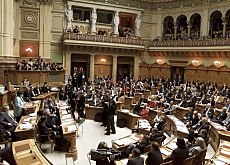Swiss praised for promoting business ethics

Switzerland leads the field in ensuring firms respect human rights when they conduct business across the world, according to a United Nations globalisation expert.
Recently appointed UN business ethics supremo John Ruggie is impressed by the Swiss government’s recognition that individual liberties cannot be divorced from economic interests.
Ruggie pointed to early Swiss support for the UN Global Compact, which stands for politically correct business practices, and for his own appointment as special representative to UN secretary-general Kofi Annan.
He was speaking at a conference on political risk in the globalised marketplace, hosted by the Swiss foreign ministry in Bern on Friday.
“The whole concept of security being all about the protection of individuals and their rights rather than the protection of states had been voiced before,” Ruggie told swissinfo. “But the Swiss and some other countries were early movers in translating that into the way the government organised itself.”
“Many countries have related to this issue as if they were watching civil societies and corporations bat a ball back and forth at a tennis match. I wish there were more governments like Switzerland in the world,” he added.
Foreign Minister Micheline Calmy-Rey told the conference that Switzerland would continue to promote ethical business practice.
“The purpose of our strategy for peace and human rights is to ensure that everyone can live in peace. This is the principle of our foreign policy that cannot be separated from economic interests,” she said.
“I am well aware that this sometimes leads to difficult choices and trade-offs, but we must remain consistent.”
Operating abroad
Swiss companies including ABB, Novartis and Nestlé outlined how they had adapted their policies abroad to take more account of human rights issues in countries such as Sudan and Nigeria.
Some Swiss firms in the fields of pharmaceuticals, engineering, banking and food production have faced criticism for their practices in the past.
“The creation of wealth and protection of human rights and the environment needs to be embedded in a company’s beliefs. A corporate branding pretence cannot be kept up indefinitely,” said ABB human resources head Gary Steel.
And Ruggie warned that it is possible to see through a smokescreen with a little checking.
“You can’t tell by the pronouncements; you have to ask if people really are being held accountable, and what happens out in the field,” he told swissinfo.
“You can’t generalise about companies from one country because there is always variation, you have leaders and laggards everywhere.”
swissinfo, Matthew Allen
John Ruggie was nappointed Kofi Annan’s special advisor on the issue of transnational corporations and other business enterprises in July of last year.
The Global Compact is an international initiative to promote human rights, the environment, fair working conditions and fight corruption in business dealings around the world. It was officially launched in July 2000.
More than 2,300 companies have signed up voluntarily to the Global Compact, including 41 from Switzerland.
In March of this year Switzerland pledged to develop an official network of stakeholders in business ethics, based at the headquarters of the International Chamber of Commerce in Zurich.

In compliance with the JTI standards
More: SWI swissinfo.ch certified by the Journalism Trust Initiative












You can find an overview of ongoing debates with our journalists here . Please join us!
If you want to start a conversation about a topic raised in this article or want to report factual errors, email us at english@swissinfo.ch.